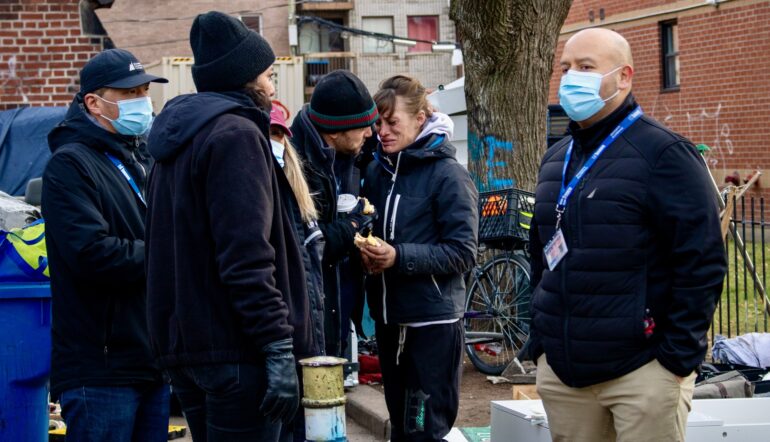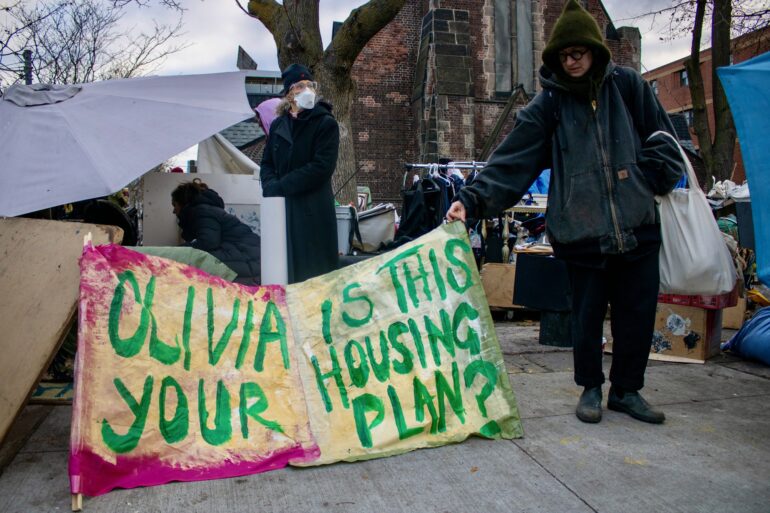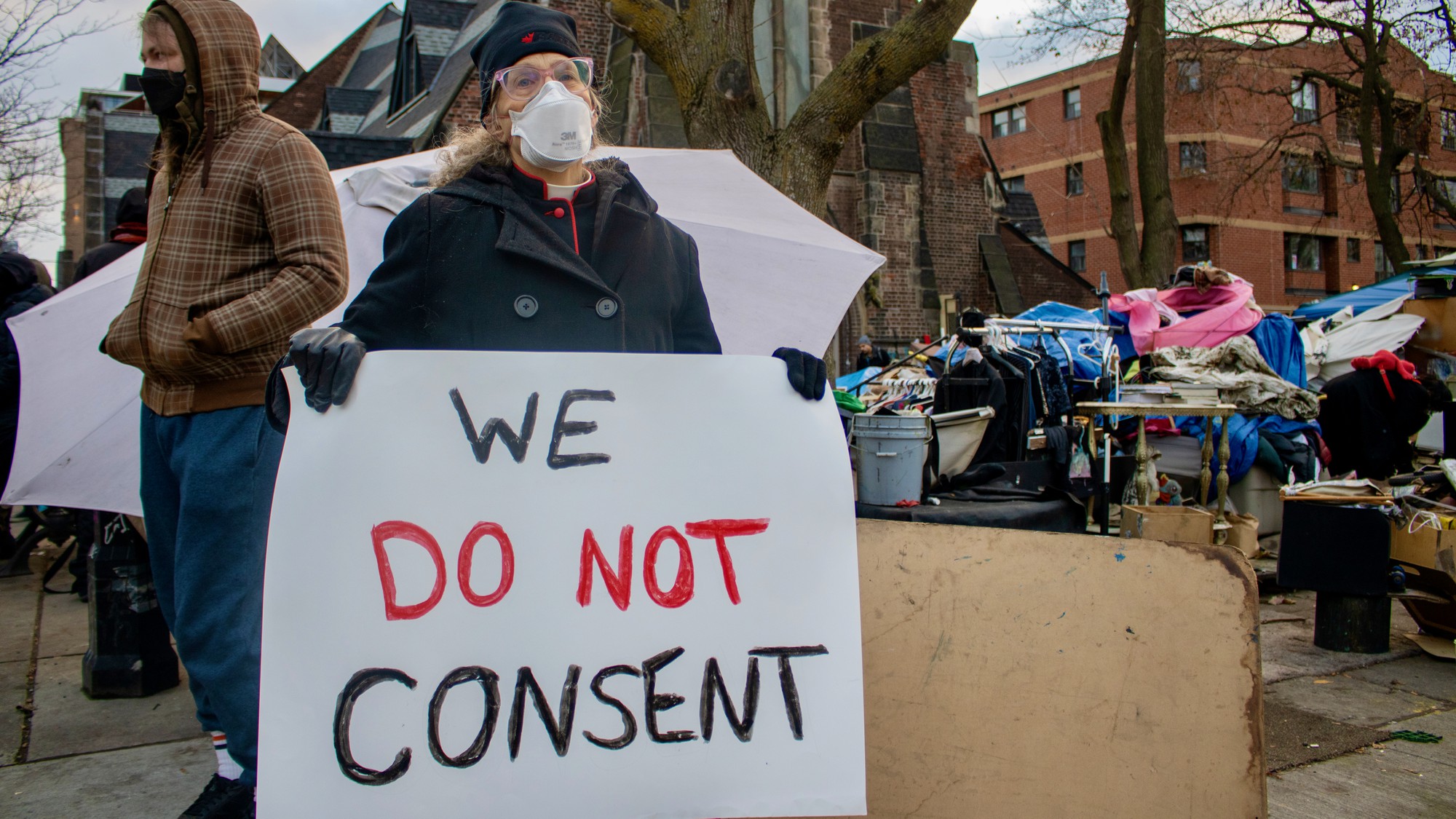By- Andre La Rosa-Rodriguez, Zoe Pierson, Brandon Harris, Adrian Olivier
Toronto has confirmed it will be clearing an encampment beside a church near Kensington Market on Friday.
Toronto spokesperson Russell Baker said in an email statement on Thursday the decision has been made “due to (an) ongoing immediate public safety risk at the encampment.”
But as of Friday afternoon, the camp hadn’t been removed.
Residents at St. Stephen-in-the-Fields Anglican Church encampment walked around their home for what they believed to be the last time Friday, gathering their most beloved, but meagre possessions.
Alison Falby, priest director at All Saints Church Community Centre, said the city moving to evict the remaining residents and clear the site is in poor taste.
“What does it do to just, I don’t know, keep displacing people, keep traumatizing people,” she said. “It’s clearly not working.”
Falby said the current housing displacement situation is like playing whack a mole, if one person gets housing, it means another will suffer.
“And playing whack a mole with people’s lives is not cool,” she said.
Falby is a close friend of Rev. Canon Maggie Helwig of St. Stephen, who advocated for her church and community this morning, with a sign that read ‘We do not consent’.
“We provide meals three times a week, we have first aid, crisis intervention, and we’re just friends,” Helwig said about the residents of St. Stephen.
Helwig said when the residents of St. Stephens encampment are evicted, they will have no choice but to move from park to park, through the upcoming winter months, as many will not accept moving to a shelter.

A resident of the encampment, Arturo Garcia, also known as ‘The Pirate,’ said this small piece of land has been his home for two years.
If evicted, Garcia said he would “just stay awake” in Kensington market so that he wouldn’t get robbed again.
With a cigarette in hand, Garcia said he had been one of the earliest residents in the encampment, and is now known as a peacemaker in the small community.
The move to evict the residents comes after the Ontario Superior Court of Justice denied an “urgent injunction” on Nov. 20 after the city presented “evidence” the site poses “fire and life safety” concerns.
The injunction was led by Helwig of the St. Stephen-In-The-Fields Anglican Church to prevent an eviction. She said on X that she does not consent to displacing the encampment’s residents beside her church.
“I wish that the city would understand that this has been a source of stability and security for some people who have experienced very little of that in their lives for many years,” Helwig said.

She said people began placing tents in the yard beside the church during spring last year as other encampments near the area were cleared. The number of residents began to grow throughout that summer. Helwig said they have been offering support by providing meals three days a week, having first aid available, and crisis interventions.
She said their support is more like “friendship” and that they are there for them to talk if needed.
“It is, in a way, an informal relationship and I think that’s part of what people have found sustaining about it. There’s been a sense that we care about them because we do,” Helwig said.
“Our position as a church has always been that if there are people coming to us who are in need of support then we will offer the support that people want and need and ask from us,” she said.
Helwig said Toronto’s decision to remove the encampment is in part because there has been an “escalating level” of complaints from a private school “a few doors away” and criticized Ward 11 University-Rosedale Councillor Dianne Saxe for being “unsympathetic.”
“There are probably some who would welcome an eviction, but probably a much larger group who are very supportive of the church and of the encampment residents,” she said.
Just a few doors down from the encampment, Patty Zulver, a teacher at Westside Montessori School, said St. Stephen residents are not safe living on the lot.
“Most importantly, I want the people who are there to be in a safe place,” she said. “Two women were sexually assaulted. Two deaths, two fires, a person got stabbed a couple of weeks ago. It’s not safe for the people living there.”
Baker said in an email statement about eight people are currently on the site and that they have been offered shelter spaces.
The statement highlighted Streets to Homes staff made 260 visits to the site this year, facilitating referrals to shelters, and assisting with access to healthcare, mental services, and other supports.
The email said there have been three fires in the encampment in the last 10 months. The most recent incident happened earlier this month.
“Through regular visits by Toronto Fire Services, it has been determined that the encampment poses a significant fire risk due to a number of factors including the dense accumulation of combustible material and an excess of hoarded materials,” Baker said.
He said this is a “tool of last resort” after unsuccessful outreach efforts.
Andrew Neelands, a volunteer at St. Stephens, said the residents support each other in ways that shelters can’t as they offer mental health support rather than just addiction support.
“They understand each other in a way that nobody else does. It functions,” he said. “It just goes. Which is kind of amazing.”
Falby said there still may be hope for the future of encampment sites, believing other cities have found ways of supporting encampment residents.
“I think it’s really heartening to read examples of what other cities do,” she said. “Because it shows us that this is, you know, that there are more compassionate approaches.”

